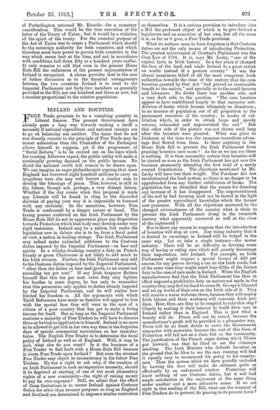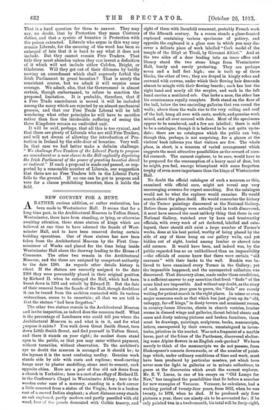IRELAND AND BOUNTIES. F REE Trade promises to be a vanishing
quantity in Liberal finance. The present Government have already gone a long way towards making a tariff a necessity if national expenditure and national receipts are to go on balancing one another. The taxes that do not run directly counter to the principle of Free Trade may be nearer exhaustion than the Chancellor of the Exchequer allows himself to suppose, yet if the programme of " Social Reform " is to be carried out on the lines which his trusting followers expect, the public outlay will make a continually growing demand on the public income. No doubt the national credit will remain to be drawn upon. We can imagine an eager philanthropist arguing that since England has borrowed eight hundred millions to carry on iniquitous wars she may well borrow a similar sum to develop the blessings of peace. This, however, is still in the future, though not, perhaps, a very distant future. Whether if the day comes when this proposal is made any Liberals will be found to cling to the discarded doctrine of paying your way it is impossible to forecast with any certainty. In the meantime, however, Free Trade is confronted by a danger nearer at hand. The taxing powers conferred on the Irish Parliament by the Home Rule Bill do not in appearance place any disposition towards Protection which that body may develop under very rigid restraints. Ireland may be a nation, but under the legislation now in debate she is to be, from a fiscal point of view, a nation in leading strings. The Irish Parliament may indeed make unlimited additions to the Customs duties imposed by the Imperial Parliament—on beer and spirits. In a whisky-drinking country a duty on French brandy or green Chartreuse is not likely to add much to the Irish revenue. Further, the Irish Parliament may add to the Customs duties imposed by the Imperial Parliament, " other than the duties on beer and spirits, to an extent not exceeding ten per cent." If any Irish taxpayer flatters himself that this ten per cent. extra duty may lighten his burden in some degree, he has only to remember that this permission only applies to duties already imposed by the Imperial Parliament, and he will realise how limited his freedom is. All the arguments with which Tariff Reformers have made us familiar will appeal to him with the special face they will wear in the eyes of a citizen of a poor country that has got to make a living income for itself. But so long as the Imperial Parliament contains a majority of Free Traders he will have to dismiss them as having no application to himself. Ireland is no more to be allowed to get rich in her own way than in the forgotten days of special commercial restrictions on her manufac- tures. The English Free Trader is to determine the fiscal policy of Ireland as well as of England. Well, it may be said, what else do you want P Is it the business of a Free Trader to find fault with a Home Rule Bill because it rivets Free Trade upon Ireland ? But even the stoutest Free Trader may object to inconsistency in his fellow Free Traders. He has a right to ask why, if the creation of an Irish Parliament is such an imperative necessity, should it be deprived at starting of one of the most elementary rights of a new community—the right of raising money to pay its own expenses ? Still, we admit that the effect of these limitations is to secure Ireland against Customs duties for other than revenue purposes so long as England and Scotland are determined to impose a similar restriction on themselves. It is a curious provision to introduce into a Bill the professed object of which is to give Ireland a legislature and an executive of her own, but all the same it is, as far as it goes, a Free Trade provision.
What its authors seem to have forgotten is that Customs duties are not the only means of introducing Protection. The greatest achievement of Grattan's Parliament was the Corn Law of 1784. It is, says Mr. Lecky, " one of the capital facts in Irish history. In a few years it changed the face of the land, and made Ireland to a great extent an arable instead of a pasture country." It was the almost unanimous belief of all the most competent Irish authorities towards the close of the century that the corn bounties granted by that Act " had proved an inestimable benefit to the nation," and specially so to the small farmers and labourers. No doubt there was another side, and a very dark side, to the question. " The corn bounties appear to have contributed largely to that excessive sub- division of farms which became ultimately so disastrous ; to an increase of population out of all proportion to the permanent resources of the country ; to modes of cul- tivation which, in order to obtain large and speedy returns, exhausted and impoverished the soil." But this other side of the picture was not shown until long after the bounties were granted. What was plain to Irishmen at the time was the immense immediate advan- tage that flowed from them. Is there anything in the Home Rule Bill to prevent the Irish Parliament from granting bounties once more ? As far as we can see there is nothing. It is then reasonably certain that bounties will be started as soon as the Irish Parliament has got over tho business necessarily attending the first trial of a newly created Constitution. The objections mentioned by Mr. Lecky will have lost their weight. The Purchase Act has revolutionized the land system, so there is no danger to be apprehended from any further subdivision of farms. The population has so dwindled that the reason for dreading any increase of it has disappeared. The impoverishment of the soil by bad farming need not be feared in the light of the greater agricultural knowledge which the farmer now possesses. With all the objections answered by the changed circumstances of the country what is there to prevent the Irish Parliament doing in the twentieth century what apparently answered so well at the close of the eighteenth ? Nor is there any reason to suppose that the introduction of bounties will stop at corn. Any rising industry that it is desired to encourage in Ireland will be helped in the same way. Let us take a single instance—the motor industry. There will be no difficulty in devising some way of taxing or rating cars which will greatly discourage their importation into Ireland. For example, an Irish Parliament might require a, special licence of £20 per annum for any person driving a car on the Irish roads, but at the same time they might remit four-fifths of the licence duty in the case of cars made in Ireland. When the English manufacturers find that the Irish Parliament has thus in effect imposed a prohibitive duty on motors not made in the country they may feel inclined to cross St. George's Channel and set up works of their own on the Irish side of it. They will receive a warm welcome there, because they will employ Irish labour, and their workmen will consume Irish pro- duce. How, then, are they to be tempted to take this step ? Clearly by making it their interest to build their cars in Ireland rather than in England. This is just what a bounty will do. Prices will not be raised, because the manufacturer's profit will be provided in a pleasanter way. There will be no fresh duties to make the Government unpopular with motorists, because the cost of this form of Protection will fall not on a class, but on the community. The justification of the French sugar duties, which Thiers put forward, was that he liked to see the chimneys smoking. The Irish Minister who defends bounties on the ground that he likes to see the cars running will find it equally easy to recommend his policy to his country- men. Thus the system which we have proudly excluded by barring the door will make its entrance quite as effectually by an unfastened window. Protection will know nothing of our Customs duties, but it will find ample satisfaction in the enjoyment of the same thing under another and a more attractive name. If we are rig ht in this reading of the Bill, what can the remnant of Free Traders do to prevent its passing in its present form ? That is a hard question for them to answer. They may say, no doubt, that by Protection they mean Customs duties, and that a system of bounties is Protection with the poison extracted. Liberals who argue in this way may remain Liberals, for the meaning of the word has been so enlarged of late that it is hard to say what it does not include. But they cannot remain Free Traders. That title they must abandon unless they can invent a definition of it which will not include either Cobden, Bright, or Gladstone. Will they get out of their dilemma by boldly moving an amendment which shall expressly forbid the Irish Parliament to grant bounties ? That is surely the consistent course, but we admit it will require some courage. We admit, also, that the Government is almost certain, though embarrassed, to refuse to sanction the proposed limitation. It is probable, therefore, that if a Free Trade amendment is moved it will be included among the many which are rejected by an almost mechanical process, and that our Free Trade Liberal will be left wondering what other principles he will have to sacrifice rather than face the intolerable suffering of seeing the three Kingdoms remain an undivided unit.
It will be said, perhaps, that all this is too cynical, and that there are plenty of Liberals who are still Free Traders, and will not dream of allowing the introduction of Pro- tection in Ireland by the side-door of bounties. Very well. In that case we had better make a definite challenge. n We challenge Free Traders of the Liberal Party to propose an amendment or a new clam to the Bill explicitly depriving the Irish Parliament of the power of granting bounties direct or indirect." If such a proposal is made and passed, or sup- ported by a reasonable number of Liberals, our suggestion that there are no Free Traders left in the Liberal Party falls to the ground. If no one can be got to propose and vote for a clause prohibiting bounties, then it holds the field.



















































 Previous page
Previous page